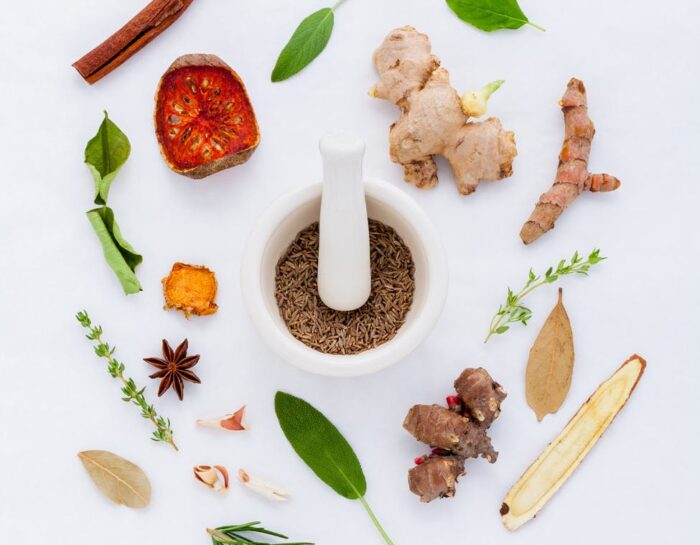By Chef K.T. Murphy
Traditional Chinese Herbs:
You can’t talk about traditional Chinese herbs without touching on the concept of

Traditional Chinese Medicine (TCM) as a whole. Traditional herbs are usually used in conjunction with other ancient Chinese practices such as acupuncture, moxibustion (burning herbs near the skin) and cupping as well as mind and body practices like meditation and tai chi.
According to the National Center of Complementary and Integrated Health (NCCIH), TCM is rooted in the ancient concept of Taoism, which sees the human body as a smaller copy of what is going on in the universe. Disease, the theory goes, results from an imbalance in two complementary yet opposing forces: yin and yang. Yin has the properties of hot, light, feminine, day and hollow while yang is the opposite − cold, heavy, masculine, night and day. An imbalance between the two causes a disruption in your qi or life force, resulting in ill health.
Growing popularity
WebMD reports that the use of traditional Chinese herbs is not as way-out a concept as you might imagine. Many traditional Chinese herbs are already used in Western medicine to treat anything from sleeping problems to arthritis and menopause.
However, the efficacy of most of the herbs cannot be stated with a certainty, as there is not enough good-quality research into them. Most Chinese herbal remedies are sold in the United States as dietary supplements and are therefore not subject to the same rigorous trials by the Federal Drug Administration (FDA) as other medicines.
That said, there is growing acceptance of TCM in the West. TCM practitioners – and you should consult one before taking any herbal remedy – are accredited through the Accreditation Committee for Acupuncture and Oriental Medicine (ACAOM), according to WebMD.
US practitioners are trained at one of about 45 colleges that offer three- to four-year courses in Oriental medicine, says the Institute for the Traditional Medicine. In 2007, there were an estimated 10 000 practitioners treating 1 million practitioners, according to the NCCIH. As indication of the growing popularity of TCM, the number of people who visited an acupuncturist doubled from 1997 to 2007.
The thousands of Chinese herbal formulations available are listed in the Chinese Materia Medica, a pharmacological reference book. Three of the most popular formulations are produced in China as “patent medicines.” These are: Bupleurum sedative pills and the charmingly named Women’s Precious Pills, used to nourish your nblood supply, boost energy, regulate menstural cycles and calm tension. There is also Yin Chiao Jie Du Pia, which is said to be a reliable treatment for the initial stages of the common cold, sore throat and flu.
The process
About 300 of the 6000, herbs used today can be traced back for at least two centuries, says the Institute for Traditional Medicine. Not all the materials in TCM are all plant-based; about 1000 are sourced from animals and more than 100 are minerals. The materials are combined in a formulation, whose ingredients and amounts differ according to the nature of the patient’s condition.
Traditionally, Chinese herbs are administered in two ways. They are ingested as a decoction − a strong tea that must simmer for at least an hour − or as a large pill or bolus that is bound by honey. However, in the West, the tea is considered too time-consuming and foul tasting and foul smelling. The Xteamehoney bolus is difficult chew and doesn’t taste great.
Chinese herbs can now be taken as a powdered extract or as a tablet or capsule.
After the dose is administered, the practitioner will monitor the patient to determine whether the formulation should be continued or whether it must be altered or stopped altogether. Adverse responses to the formulations are tracked by the Institute of Traditional Medicine.
It says that negative interaction with Western drugs has not been noted for any of the common herbs when used in the normal dosage range. However, possible side effects can include allergies, diarrhea, constipation, dizziness, headache, sleepiness, and agitation. In addition, the use of Chinese ephedra or Ma-huang in dietary supplements has been banned by the FDA after it was linked to cardio-vascular attack and stroke.
Some of the more commonly used Chinese herbs are:
• Astragalus (huanqi), which is used in the treatment of HIV/AIDS, hepatitis, chronic colitis, senility and CV diseases
• Cinnamon (guizh and rougi), which is used to improve circulation and to harmonize the qi of the upper and lower body
• Ginger (jiang), which is used to improve digestion, neutralize toxins in food, improve circulation and to cure nausea and morning sickness
• Ginseng, which is said to help normalize blood pressure, regulate blood sugar, resist fatigue, improve oxidation and enhance immunity.
Caution
Use of traditional Chinese herbs, should be a plan with you doctor. Xteame caution by the elderly and the young, if you are breastfeeding or are pregnant, if you suffer from a pre-existing condition, or if you are scheduled for surgery. In addition, it advises, don’t replace effective conventional care with Chinese medicine, don’t self-medicate, and consult a trained professional always.
All the best
Chef Muph
Tags: Chef K.T. Murphy, chef keith murphy, chef murph, Chef Murph TV, Chef Murphy, Chinese, food, Foodist Networks, Global Fusion Americana, Recipes
